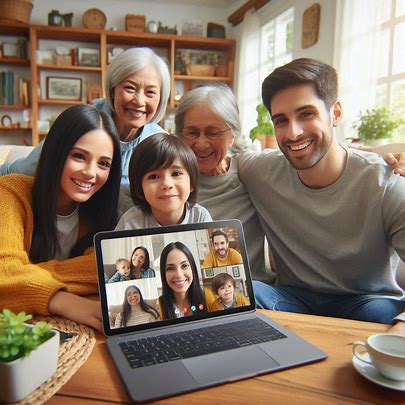Over 4.7 billion people worldwide use social media today, which means digital platforms have become a crucial tool for staying connected. Families can use these platforms to maintain communication, share experiences, and build stronger bonds. While traditional communication methods like phone calls and emails are still in use, social media apps and messaging services have revolutionized how families interact, especially those living apart.
One of the most effective ways to keep in touch with relatives is through private family groups on platforms like Facebook, WhatsApp, or Telegram. These apps allow families to create dedicated spaces to post updates, share photos, and plan events. Family members, regardless of their physical location, can instantly interact with one another. Whether it’s a group photo from a family event, a quick status update, or a message of encouragement, these platforms provide the ideal environment for maintaining connections. For more detailed strategies to engage family members, sources for effective family engagement strategies for children (celebratesel.com/top-strategies-for-effective-family-engagement-for-children/) can help foster healthier communication patterns.
Private Family Groups: The Backbone of Digital Communication
 Creating private family groups on messaging platforms offers several benefits. Not only does it ensure that your communication is safe and secure, but it also helps organize discussions around specific topics. For example, one group could focus on planning holidays, while another could be for casual check-ins or catching up on life events. The ability to instantly send messages, share videos, and organize group calls makes it easier than ever for family members to stay in the loop.
Creating private family groups on messaging platforms offers several benefits. Not only does it ensure that your communication is safe and secure, but it also helps organize discussions around specific topics. For example, one group could focus on planning holidays, while another could be for casual check-ins or catching up on life events. The ability to instantly send messages, share videos, and organize group calls makes it easier than ever for family members to stay in the loop.
Facebook and WhatsApp are among the most popular platforms for family groups due to their accessibility and wide range of features. On Facebook, you can create a private group where only invited members can view the posts. This ensures that family updates are shared only with those you trust. WhatsApp, on the other hand, allows for instant messaging, which is perfect for quick check-ins or urgent updates. The simple, user-friendly interface of these apps makes them ideal for family communication, especially for those who may not be as tech-savvy.
Video Calls: Bridging the Gap
Video calls have become an essential part of family communication, especially during social distancing or travel restrictions. Platforms like Zoom, Skype, and Google Meet allow families to connect face-to-face without leaving their homes. These video calls enable family members to see each other, share special moments, and engage in activities together, even from miles away.
Video calls can be particularly beneficial for families with young children. For example, grandparents can read bedtime stories to their grandchildren, or cousins can play games virtually. This face-to-face interaction fosters a sense of togetherness and helps build relationships despite the physical distance. Whether celebrating a birthday, attending a virtual family reunion, or just catching up on each other’s lives, video calls allow families to maintain strong connections.
Shared Calendars and Event Planning
Another way families can use digital platforms for communication is by sharing calendars and planning events. Apps like Google Calendar, Cozi, or family-specific planning tools allow families to stay organized and coordinate events such as birthdays, anniversaries, and vacations. These shared calendars ensure no one misses important events and allow everyone to contribute their ideas and availability in real-time.
For instance, a shared calendar can be used to keep track of school events, doctor’s appointments, or family get-togethers. This is particularly useful for families with busy schedules, ensuring everyone is on the same page. Event planning tools also allow for easy collaboration, whether creating a gift list for a birthday or coordinating travel arrangements for a family trip.
Engaging in Virtual Activities
Digital platforms also allow families to engage in fun, shared activities without being in the same physical space. From online games to virtual cooking classes, there are countless ways to stay entertained and connected. Many platforms host multiplayer games that allow families to play together in real time, creating shared experiences that are just as enjoyable as in-person activities.
Virtual activities can also include collaborative projects like creating a digital scrapbook, putting together a family recipe book, or even starting a family blog or vlog. These activities give family members something to look forward to and can provide a meaningful way to stay connected while having fun together.
READ ALSO: Reels of Success: Instagram Best Practices for Companies
Conclusion
Leveraging digital platforms for family communication not only helps stay connected but also fosters deeper, more meaningful relationships. Whether through private groups, video calls, or shared calendars, these tools offer a variety of ways to engage with family members, no matter where they are. By incorporating digital communication tools into everyday life, families can strengthen their bonds and stay involved in each other’s lives.
Embracing these platforms opens up endless possibilities for maintaining family ties and creating lasting memories, making it easier to stay connected and engaged in a fast-paced, digital world.
